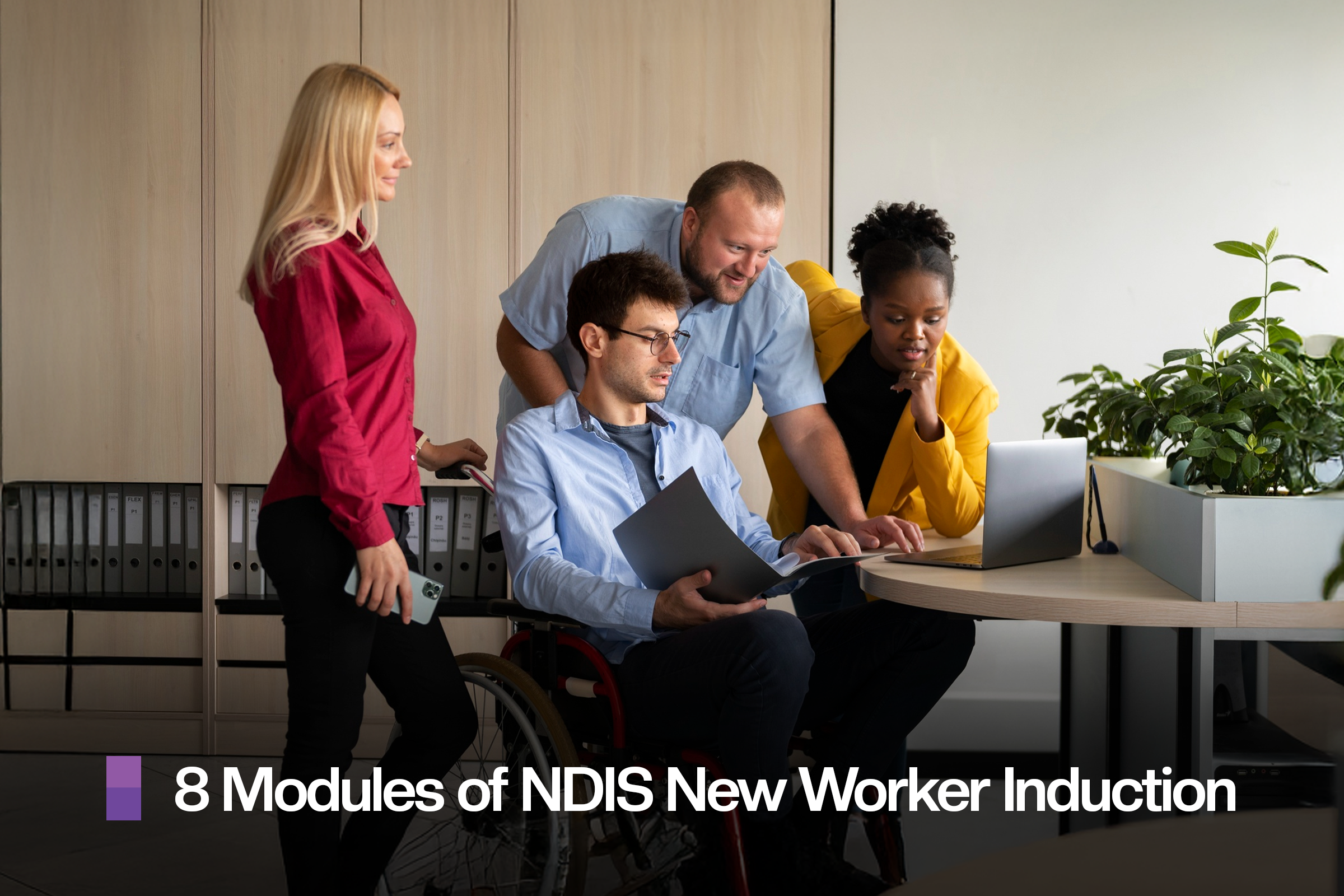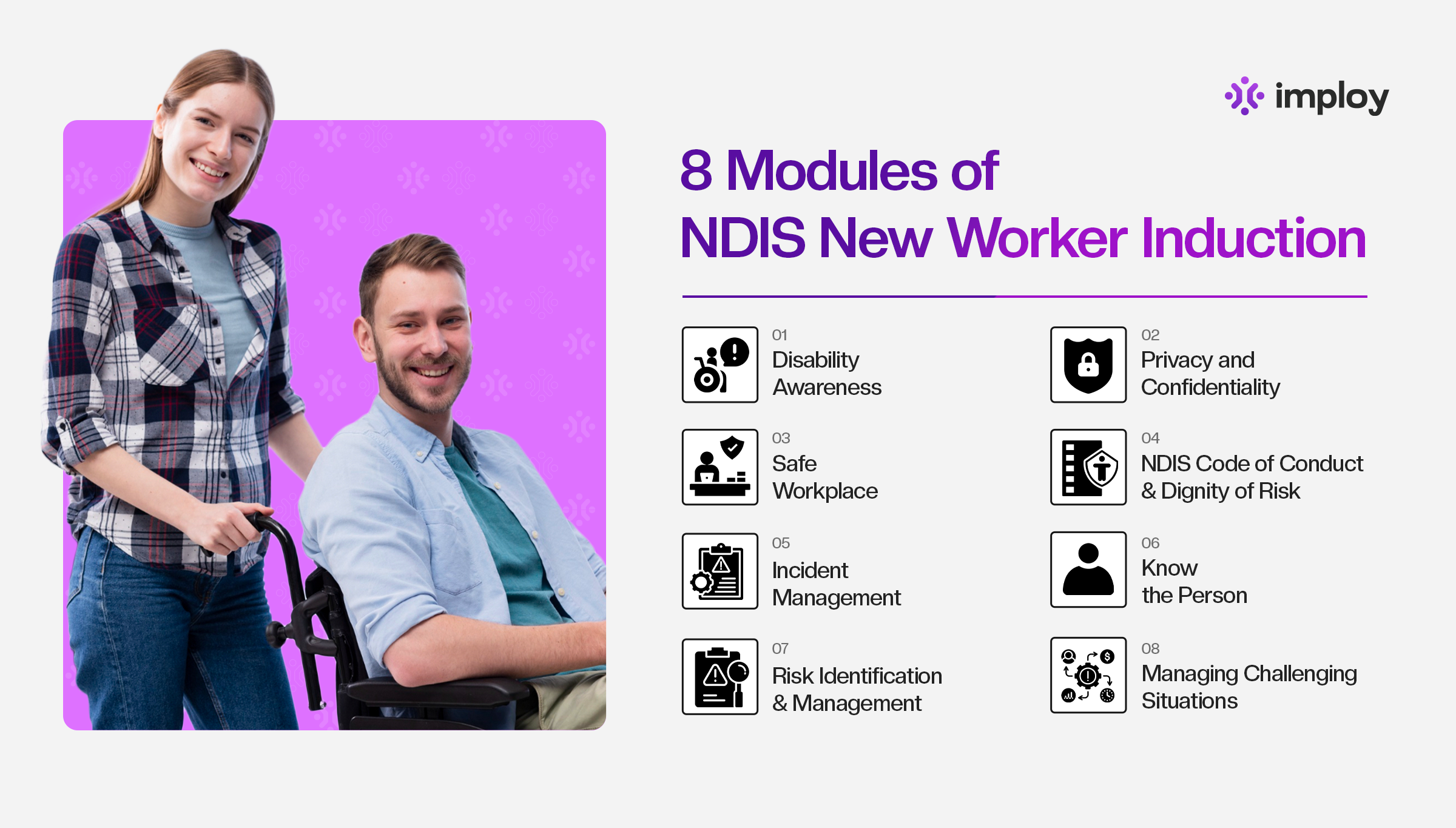The Ultimate Guide to the NDIS New Worker Induction Module
Discover the NDIS New Worker Induction Module: why it’s mandatory, what it covers, provider duties & tools to simplify compliance and onboarding.

Starting strong in the disability sector matters. For new workers, the first few weeks often set the tone for their entire career. For providers and employers, ensuring compliance and quality from day one isn’t just about meeting legal obligations, it’s about protecting participants, building trust, and reducing costly mistakes.
That’s where the NDIS New Worker Induction Module comes in. Designed by the NDIS Quality and Safeguards Commission, this online training program equips new disability support workers with the essential knowledge and values needed to deliver safe, respectful, and effective support.
But here’s the catch: completing the induction module is just the beginning. Providers also need systems in place to monitor compliance, support staff development, and handle the ongoing complexities of workforce management. That’s why platforms like Imploy can make such a difference, helping organisations streamline rostering, payroll, PRODA integration, and compliance tracking so teams stay focused on what matters most: quality care.
In this guide, we’ll break down everything you need to know about the NDIS New Worker Induction Module, what it covers, why it’s mandatory, how providers should embed it into onboarding, and how tools like Imploy can simplify compliance.
What is the NDIS New Worker Induction Module?
The NDIS New Worker Induction Module is an online learning program created by the NDIS Commission. It is designed to help new workers entering the disability sector understand their responsibilities and the standards expected when supporting NDIS participants.
Who needs to complete it?
- All new workers in the disability sector, whether with a registered or unregistered provider.
- Contractors and casual staff delivering NDIS supports.
- Workers new to disability support, even if they’ve worked in related fields.
What it does and doesn’t cover?
- It introduces workers to fundamental principles: rights, dignity, safety, inclusion, and compliance.
- It does not replace organisation-specific training, on-the-job learning, or role-specific training (e.g., manual handling, medication support).
How it fits into the bigger picture?
The induction module complements the Worker Orientation Module: Quality, Safety and You. Together, they provide a foundation for NDIS worker training, ensuring consistency across the workforce and helping providers demonstrate compliance during audits.
Breakdown of the Eight Modules
The NDIS New Worker Induction is built around eight core modules, each addressing a fundamental area of disability support practice. Together, they equip new workers with the knowledge and confidence to provide safe, ethical, and participant-centred care.
1. Disability Awareness
This first module lays the foundation by introducing different types of disability and challenging common stereotypes. Workers learn the difference between the medical model and the social model of disability, gaining insight into how attitudes and environments impact inclusion. The emphasis is always on rights, independence, and meaningful participation for people with disability.
2. Privacy & Confidentiality
Handling sensitive information is a daily responsibility for support workers. This module covers both the legal and ethical obligations around participant data, from secure record-keeping to respecting personal boundaries. It also provides clear steps to take in the event of a privacy breach, ensuring compliance with privacy laws and safeguarding trust.
3. Safe Workplace
Workplace safety is non-negotiable. Module 3 focuses on the essentials of Work Health and Safety (WHS), from hazard identification to infection control. Workers are guided through practical strategies for maintaining safe environments both for themselves and for participants.
4. NDIS Code of Conduct & Dignity of Risk
Every NDIS worker must follow the NDIS Code of Conduct, which outlines expectations around respect, safety, integrity, and accountability. This module also introduces the concept of dignity of risk, helping workers balance a participant’s right to make choices with their duty of care. Through real-life scenarios, workers practice ethical decision-making in complex situations.
5. Incident Management
Incidents can and do happen in care environments, and Module 5 ensures workers know how to respond appropriately. It defines what qualifies as an incident under the NDIS framework, including reportable incidents, and explains the correct processes for documenting, reporting, and escalating. Workers also learn how to use incidents as opportunities for continuous improvement.
6. Know the Person
Good support starts with truly knowing the person you’re working with. This module emphasises person-centred practice, encouraging workers to understand each participant’s goals, values, and communication preferences. It also highlights the importance of cultural competence and respecting diversity within the disability community.
7. Risk Identification & Management
Risk management is an ongoing process. Here, workers are trained to spot potential risks in daily practice, carry out risk assessments, and create mitigation plans. The module reinforces the need for continuous monitoring and proactive reporting to protect participants and workers alike.
8. Managing Challenging Situations
Finally, Module 8 prepares workers for real-world challenges. From de-escalation techniques in conflict situations to maintaining professional boundaries and building emotional resilience, this module provides practical tools for navigating difficult moments. Workers are encouraged to lean on support networks and supervision to stay safe and effective in their roles.

Legal, Regulatory & Compliance Requirements
The NDIS Quality and Safeguards Commission requires that all new workers complete the induction module.
1. Why it matters for providers
- Demonstrates compliance during audits.
- Reduces risk of worker error or misconduct.
- Protects participant rights and safety.
2. What are the responsibilities of NDIS providers?
NDIS providers must:
- Ensure all new workers complete the NDIS New Worker Induction Module and the Worker Orientation Module.
- Deliver additional role-specific and organisation-specific training.
- Monitor compliance, maintain accurate training records, and support ongoing development.
- Uphold the NDIS Code of Conduct, safeguard participant rights, and provide safe, quality services.
Consequences of non-compliance
- Potential sanctions from the Commission.
- Loss of trust with participants and families.
- Increased risk of legal liability if something goes wrong.
Best Practices for Providers & Employers
Simply asking workers to “tick the box” is not enough. To maximise impact:
- Embed the module into structured onboarding: Include follow-up discussions, quizzes, or case studies.
- Pair new workers with mentors: To reinforce learning in real-world situations.
- Schedule refresher training: Many providers require re-completion every 12 months to reinforce compliance.
- Track and monitor completion: Using systems like Imploy to ensure no one slips through the cracks. Imploy helps by simplifying compliance tracking, automating reminders, and ensuring every worker stays up to date with mandatory training.
Tips for New Workers
If you’re a new support worker:
- Set aside dedicated time the module takes ~90 minutes.
- Take notes of many questions in the field that link back to induction principles.
- Ask questions and supervisors can provide context for real-world application.
- Reflect on your values. The induction is designed to prompt thinking about rights, choice, and dignity.
How Imploy Helps Streamline Compliance & Workforce Management
The induction module is essential, but managing compliance across an entire workforce is another challenge. That’s where Imploy helps.
- Compliance tracking: Monitor which staff have completed mandatory modules, get alerts for expiries, and automate reporting.
- PRODA integration: Simplifies dealing with government systems and NDIS compliance requirements.
- Mobile access: Staff can upload certificates or complete tasks directly from their devices.
- Rostering & payroll: Ensure only compliant workers are rostered, while automating payroll processes.
- Automated reporting: Reduce admin time and give managers clear oversight of workforce compliance.
Scenario Example: A provider hires five new support workers. Instead of manually chasing certificates, managers can use Imploy to track induction completion, generate compliance reports, and ensure only trained workers are rostered, saving hours of admin time.
Conclusion
The NDIS New Worker Induction Module is more than a formality, it’s a cornerstone of building a capable, compliant, and participant-focused workforce. For new workers, it’s the first step into a rewarding career. For providers, it’s a non-negotiable compliance requirement that also supports quality and safety.
But completing the induction is just the beginning. To keep your workforce compliant, efficient, and supported, consider implementing a solution like Imploy. From compliance tracking to rostering, payroll, and PRODA integration, Imploy simplifies the admin so you can focus on what truly matters: delivering excellent care.
Frequently Asked Questions (FAQs)
1. Is the NDIS New Worker Induction Module mandatory for all disability support workers?
Yes. All new workers entering the disability sector are expected to complete it, regardless of provider registration status.
2. How long does it take to complete the NDIS Worker Orientation Module?
The Worker Orientation Module: Quality, Safety and You (separate from the New Worker Induction) takes around 90 minutes to complete. Like the induction, it is mandatory and self-paced online.
3. What is Module 3 in NDIS?
Module 3 is Safe Workplace, focusing on WHS responsibilities, hazard prevention, and infection control.
4. What is Module 5 in NDIS?
Module 5 is Incident Management, teaching workers how to report, document, and respond to incidents under NDIS rules.
5. What are the responsibilities of NDIS providers?
Providers must ensure new workers complete induction, provide additional training, uphold compliance, and maintain safe, participant-focused services.
6. Do I need to repeat the induction module eventually?
While not legally mandated, many providers require annual refreshers to reinforce compliance.
7. What if I already have experience in disability support?
You still need to complete the module, as it ensures consistency across the workforce.
8. Can the induction modules be done remotely?
Yes, they are online and self-paced, accessible via the NDIS Commission’s learning portal.
9. What happens after completing the induction?
You receive a certificate of completion, which employers will store as part of compliance records.
Additional Resources
- NDIS Commission – New Worker Induction Modules
- NDIS Commission – Online Training Modules
- Worker Orientation Module: Quality, Safety and You






